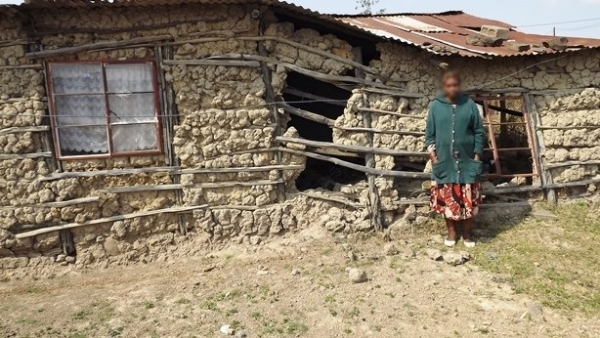No better than sleeping under a tree for 20 years, says ailing woman

Fifty-six-year-old Fikile Mlotshwa (not her real name) from Imbali in Pietermaritzburg has had to bear the winter cold and summer rains in a leaking mud house for over 20 years. She tested HIV positive 10 years ago and she is on ARV medication.
After she broke her arm she was forced to stop doing heavy work. She now does washing for her neighbours and earns R80 a day.
On numerous occasions, she has been a victim of theft and house robbery. “Last year they ripped out the electric cable and that left me without electricity,” she says. She now cooks on a fire outside her home.
“Sometimes we sleep in the dark if we don’t have candles,” she says.
The house has four rooms. The windows are broken and patched with black refuse bags. There is one pit toilet.
She lives with a 61-year-old relative. They share a room. She sleeps on the floor and he uses the bed. The bed is made of wood and is supported by the stones to balance it. Her relative built the toilet three months ago, after neighbours complained about them using their toilets.
“I have been living here for over 20 years and I have come to terms with the situation. I originate from Impendle location. After losing my relatives, one by one in Impendle, I was forced to find a place to belong. A relative used to own this house before she passed on and that is how I got it,” she says.
“The house leaks [so badly] it’s nothing different from sleeping under a tree. When you are living under a tree you are only protected by the leafs of that tree. That is exactly what I have been going through for 20 years … I know that I have a task of fixing it [because it is a mud house] every year, depending on which part has been demolished.”
“I sometimes go to bed without food,” she says. Then she skips taking her medication because she has an empty stomach. “I can’t even go to the nearest tuck shop to take food on credit because I sometimes miss my payments.”
“I have applied for grant, but it hasn’t been approved. Each time I forward an application it is always disapproved. I do not know which door to knock on, since I have been declined numerous times. It has always been the same response when applying for a house. It has never been approved and I don’t receive feedback on what other attempts I should try,” she says.
Ward councilor Ganeth Mlete says, although Ward 15 is his area, he doesn’t know it.
“I will do a follow up on the matter and see the area myself,” said Mlete. “I will also advise Mlotshwa to call me herself so that I will see how she can be assisted.”
He was unclear as to whether there were housing projects in the pipeline that could help Mlotshwa.
KZN Social Development spokesperson Ncumisa Fandesi said Mlotshwa had best contact a local social worker who will come and assess her situation and make the necessary intervention based on her unique circumstances. Fandesi said there is no social grant that is specific to people who are HIV positive, however there is a grant for people who are temporarily incapacitated for whatever reason, including illness or injury causing temporary disability.
Provincial chairperson for Treatment Action Campaign (TAC) Patrick Mdletshe said they are familiar with such cases. “What we do is that we speak to the ward councilor and the community caregivers in the area … This is one of those cases that show that people still lack knowledge and information as to where to go to and who to speak to when they are facing problems,” said Mdletshe.
“On this matter there should be an intervention from different departments. Department of Social Development should intervene. There is also a war room in every ward. War rooms are platforms. That is where people should be able to speak and discuss matters that are troubling them. It’s a disappointing situation that needs to be taken seriously especially by the ward councilor,” said Mdletshe.
Editor’s note: No one in a society with as much food production as ours should go hungry or miss a meal. It is an indictment of our society that Ms Mlotshwa endures hunger. However, it is not true that if you do miss a meal, that you have to miss your ARVs. Most ARVs are safe and effective with or without food.
Support independent journalism
Donate using Payfast

Don't miss out on the latest news
We respect your privacy, and promise we won't spam you.

This article is licensed under a Creative Commons Attribution-NoDerivatives 4.0 International License.
